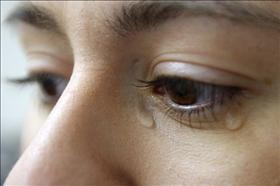6th periodic UN report on Elimination of Discrimination against Women in Israel
Religion & gender discrimination in Israel
An important reaffirmation of Hiddush's assertion that addressing the challenge of religious freedom & equality requires a more comprehensive, systemic, proactive, and bold overhauling was published this month by the United Nations Committee on the Elimination of Discrimination against Women (CEDAW) in its sixth periodic report on Israel.
27/11/2017 22:03
Tags: women · United Nations · discrimination against women · gender discrimination

Tears, source: Wikipedia
Hiddush has stressed numerous times that the challenge of religious freedom & equality in Israel exceeds the common headline treatment that focuses on issues like worship at the Kotel, the status of non-Orthodox Judaism, “Who is a Jew?” etc. An important reaffirmation of Hiddush's assertion that addressing this challenge requires a more comprehensive, systemic, proactive, and bold overhauling was published this month by the United Nations Committee on the Elimination of Discrimination against Women (CEDAW).
The Committee on the Elimination of Discrimination against Women is a body of independent experts that monitors implementation of the Convention on the Elimination of All Forms of Discrimination against Women. CEDAW Committee consists of 23 experts on women’s rights from around the world, including Prof. Ruth Halperin-Kaddari, Chair of the Ruth and Emanuel Rackman Center for the Advancement of the Status of Women at Bar Ilan University and is a senior lecturer at Bar-Ilan University's Law School in Feminist Jurisprudence and Bioethics.
The organization is a leading player in the international discourse on issues of gender equality, and CEDAW’s periodic report on Israel is of great importance. While the commission's most recent periodic report covers all forms of discrimination, one should easily assume that much of what CEDAW found to be incompatible with internationally held norms and conventions regarding equality of women emanates from the link between religion and politics, given the role played by Israel’s religious functionaries in setting state policy and controlling services such as marriage and divorce.
Here are the key examples of discrimination given in the report, stemming from Israel’s unholy alliance of religion and state:
The law does not provide for civil marriages, and even spouses who contract civil marriage outside the State party are still subject to the jurisdiction of religious courts in divorce cases.
- Limitations on freedom of movement continue to impact women in public spaces, including transportation, and, at times, have led to their exclusion from educational, commercial and religious environments, by certain ultra-orthodox movements, imposing their observance of religion in a way that contravenes the fundamental rights of women and girls.
- Discriminatory stereotypes based on restrictive religious interpretations concerning the roles and responsibilities of women and men in the family and in society persist in the State, particularly among ultra-Orthodox Israelis.
- Women suffer from discrimination in divorce matters as they are under the influence of discriminatory religious laws. Given that under Jewish law, only men can grant consent for a divorce (Gett), women are susceptible to extortion by their husbands and concede to certain marital terms in return for a Gett.
- Married women who are unable to divorce for lack of receiving the Gett continue to suffer stigma and discrimination when they bear a child with men who are not their husbands.
- There is a lack of concrete measures to address discrimination by ultra-Orthodox parties, namely UTJ and Shas, whose party regulations bar women from being appointed as members of political parties or from being political candidates, and at the State Attorney’s opinion that there is no legal basis for invalidating these regulations or for excluding these political parties from participating in elections, despite the fact that party statutes should not be allowed to derogate from the Basic Law: human dignity and freedom and Basic Law: the Knesset.
- There is a low number of women in the Knesset (Parliament), ministerial positions, senior academic and diplomatic positions, and women cannot serve as judges in Rabbinical courts.
- There are gaps on equal access to education experienced by Israeli Arab, Bedouin and ultra-Orthodox women and girls who as result continue to have higher drop-out rates and poor outcomes in higher education.
- The participation of Bedouin and ultra-Orthodox women in the labour market is limited.
- The law does not provide for civil marriages, and even spouses who contract civil marriage outside the State party are still subject to the jurisdiction of religious courts in divorce cases.
It is important to emphasize the fact that these infringements stand in sheer contrast to the will of the overwhelming majority of the Israeli public. They represent another example where civil liberties and human dignity have fallen victim to political opportunism and surrendering such key concerns as gender equality to the whims and prejudices of fundamentalist Orthodox politicians.
Hiddush's ongoing polling of public opinion in Israel shows how wide the gap between the policies and public opinion is, including that of growing circles of Modern Orthodoxy, as can be demonstrated in the following examples:
- 79% support that the Parties’ Law should be amended to require all parties to include women in realistic positions on their lists of Knesset candidates. This is an increase of 28% in support from last year. [link]
- 75% of the Israeli Jewish public and 95% of the secular Jewish public expressed their support for coed military service. [link]
- 90% of the adult Jewish public is dissatisfied with the Israeli Rabbinical Courts' way of dealing with Agunot and women whose husbands refuse to grant them divorces. 87% believe that the rabbinical courts should force husbands to grant their wives divorces in cases of domestic violence. [link]